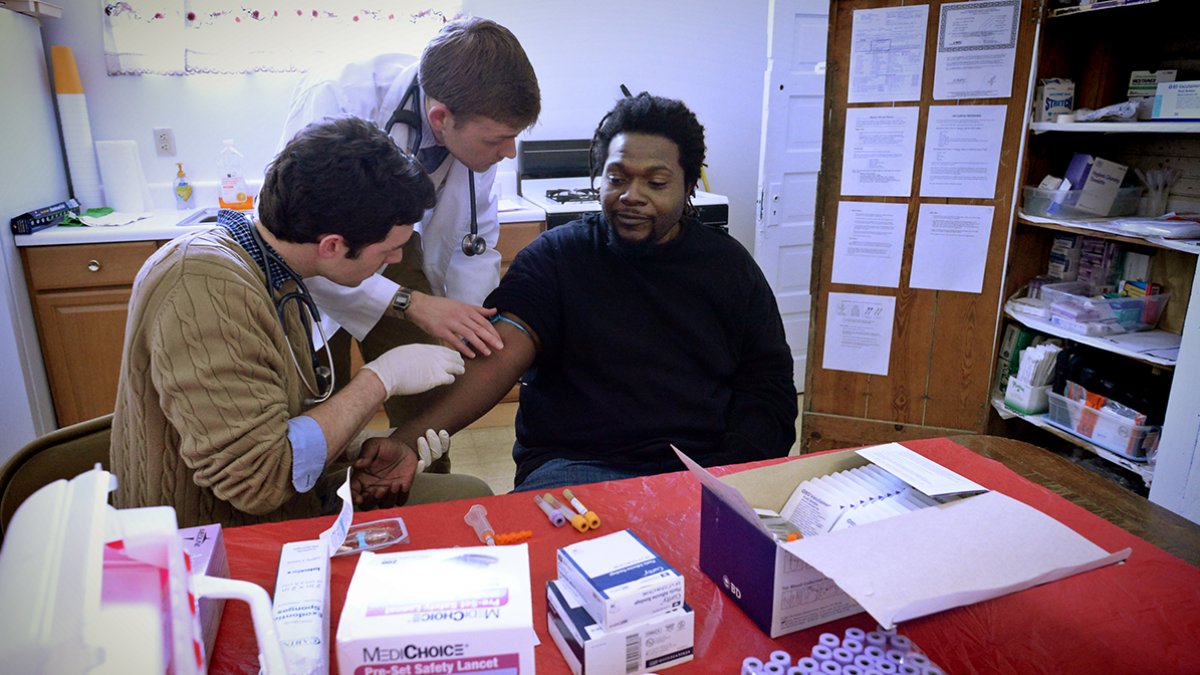The people’s clinic
Each month, UNC School of Medicine students take their skills to Whitakers, North Carolina to help the rural community.

Ethel Jones sits in the front of the small wood church facing the pews, looking up from the Saturday newspaper periodically to take an inventory of the waiting room. At 9:30 a.m., Gilbert Sutton is escorted past Jones and into a dining room, where his vitals are taken as he watches the kitchen transform into a medical lab.
The bathrooms are turned into exam rooms and the kitchen pantry is unloaded of its blood vials.
It’s not a typical doctor’s office, but at the Bloomer Hill People’s Medical Clinic, the staff makes do.
On the first Saturday of every month, the church that sits in a dirt parking lot in Whitakers, N.C., is turned into an irreplaceable resource for the community. There, University of North Carolina medicalstudents provide free health care to who ever walks in.
“[The clinic] means a lot to the surrounding community,” said Jones, who has been volunteering at the clinic for more than two decades. “People know that they can come here when they don’t have the money to go to a regular doctor. Most people have insurance, but they still have to pay the copay.”
The clinic, open to residents in Nash and Edgecombe counties, began in 1986 after a group of medical students from the University hosted a health fair to investigate the main health problems in the area.
Since then, students have been traveling the two hours to the 512-acre town of less than 800 people every month. The clinic is staffed by first- and second-year medical students under the supervision of an attending doctor — typically from UNC Hospitals.
While the second-year students are working in the clinic as part of an elective, the first-years volunteer their time for hands-on training.
“[Second-year medical students] are doing the full history and physical for whatever complaint that the patient has,” said Margaret Pray, a second-year medical student and a clinic coordinator. “The first-years are here taking vitals and shadowing us. We mentor them and help them build up their physical history taking skills.”
On a normal weekend, Pray said, four to six patients will come into the clinic with two students assigned to each. During the summer, however, the sanctuary-turned-waiting room can quickly fill up with a dozen young patients needing school and sports physicals.
“That’s actually a really great opportunity for us to practice exam skills and interact with people in a low-stakes scenario because we’re just making sure that the kids are healthy enough to play sports,” said Tyler McKinnish, a second-year medical student.
The clinic handles much more than simple checkups. It is a full-service medical center that provides care for chronic illnesses and colds, and is capable to doing lab tests.
“If people didn’t have the money to go to the doctor, they wouldn’t have gone to the doctor,” Jones said. “We’ve had some close calls and some people finding things that would have terminated them if they hadn’t come here to find out they had it.”
Each visit begins with vitals in the dining room before the patient is taken to a private room for the checkup — any room in the church can be turned into an examination room. After meeting with the patient, the students consult with the attending doctor before prescribing medicine or requesting lab work.
With the financial constraints of a majority of the patients, the students sift through a list of the most inexpensive medication to help people get the treatment they need.
“I think it has taught us a lot about how to interact with people, especially with people who might have limited resources and how different that might look from a patient at UNC or in a bigger city,” Pray said. “These people have a lot of obstacles to getting medications and I feel like we’re becoming more resourceful.”
With the students’ regular equipment more than two-hours away in Chapel Hill, students face a variety of challenges with even everyday tasks. At Bloomer Hill People’s Medical Clinic resourcefulness is crucial in all aspects of their work.
Lacking access to a full-scale medical clinic, McKinnish has been forced to find new solutions for running labs. For labs that require refrigeration, he’ll pack a bag of ice for the trip back to Chapel Hill. Other times, when the ideal tests aren’t available at the clinic, McKinnish will determine a comparable test within their constraints.
“That’s been the most important thing for me educationally: just having that extra thing to think about that maybe practicing in Chapel Hill or in a hospital would have shown me,” McKinnish said. “That thought process is important for any physician.
“We benefit so much from this, and I think it means as much to us as it does to them — we learn from them. There are patients that we’ll never forget because we’re so early in our training that anything they can do for us — any challenge that they can present — is a learning opportunity we’ll never forget.”




